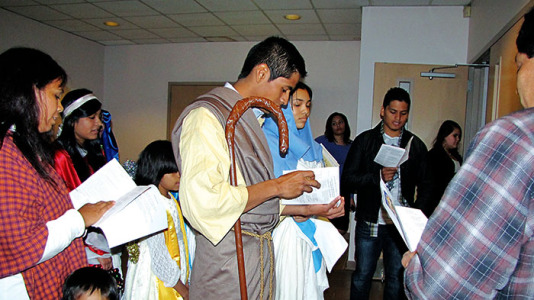By Elsa Baughman
(Editor’s note: As part of observing Child Abuse Prevention Month, Mississippi Catholic will feature efforts to combat child abuse throughout the month of April.)
In the 2014-2015 year, 26 runaway homeless youth from eight counties in Mississippi stayed at Sally Kate Winters shelter in West Point for a total of 258 nights.
Sally Kate Winters Family Services has 36 Safe Place locations in six counties. All fire stations in Columbus, Starkville and West Point participate in the Safe Place program. In Mississippi there are 103 Safe Place locations, each displaying the yellow and black Safe Place sign, the symbol of help and safety for youth between 12 and 17 years old.
Safe Places are youth-friendly businesses, schools, fire stations, libraries, fast food restaurants, convenience stores, YMCAs and other appropriate buildings which connect youth in crisis with the local licensed Safe Place agency.
Jacklyn Weir, a resource coordinator at West Point Sally Kate Winters Family Services, believes that the Safe Place Program is successful because of the commitment that the community has for the safety of the youth. “It takes all of us to make sure that youth are safe,” she said, adding that the first 72 hours are critical. “If we can get them to safety, then that will be one less statistic.”
Weir noted that youth run away for many reasons. “One thing that I would stress as a professional as well as a parent is to listen attentively to what our youth are saying to us,” she said.
She pointed out that most young people hear about Safe Place during school presentations and information booths where they receive an information card that has the local Safe Place phone number and explains that the help is free and confidential. Teens also hear about the program through word of mouth, social media and public service announcements on radio or TV.
Safe Places works as follows:
A young person who enters a Safe Place location and asks for help is offered a comfortable place to wait while the employee calls the local Safe Place licensed agency. Within 30 minutes, a Safe Place representative will arrive to talk with the youth and, if necessary, provide transportation to the shelter for counseling, support, a place to stay or other resources.
Once at the Safe Place agency, counselors meet with the youth to determine the best way to work through the problem. The counselor will contact the youth’s family to confirm the youth’s safety. Family agency staff makes sure the youth and their families receive the help and professional services they need.
The agency also runs TXT 4 HELP, a 24-hour, text-for-support service which provides access immediate help and safety for teens. Youth can text the word “SAFE” and their current location (address/city/state) to 69866 and receive a message with the name and address of the closest Safe Place location, as well as the number for the local youth shelter agency.
Users also have the option to text interactively with a mental health professional. The service is free, but regular text messaging rates will apply to the user’s phone bill.
The following agencies are licensed to operate the Safe Place program in Mississippi:
• Sally Kate Winters Family Services in West Point, (serves Caledonia, Columbus, Macon, New Hope, Starkville, West Point), www.sallykatewinters.org
• South Mississippi Children’s Center in Hattiesburg, (serves Collins, Ellisville, Hattiesburg, Laurel, Petal, Purvis, Wiggins), www.mchscares.org
• Warren County Children’s Shelter in Vicksburg (serves Port Gibson, Vicksburg, Yazoo City), www.mchscares.org.
There are some cities and regions without Safe Places. If a teen uses the TXT 4 HELP service and there is not a close Safe Place, they’ll be referred to the closest youth shelter. If there is not a shelter in the city, they will be referred to the National Runaway Safeline.
For more information contact the National Safe Place, 888-290-7233, (during business hours) or email info@nationalsafeplace.org.

